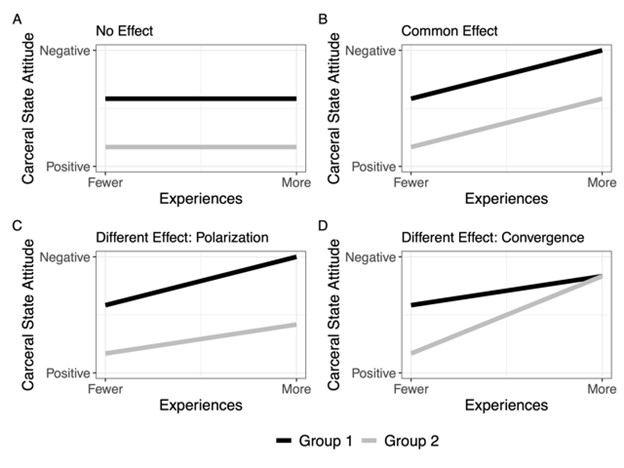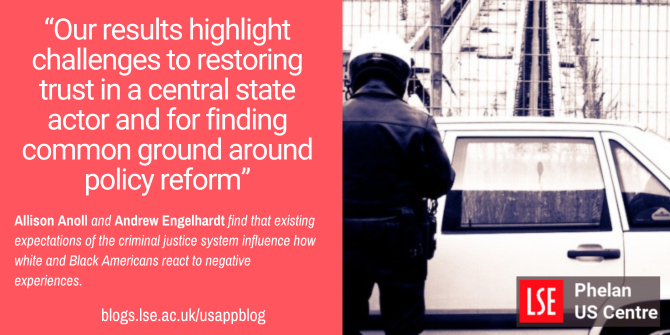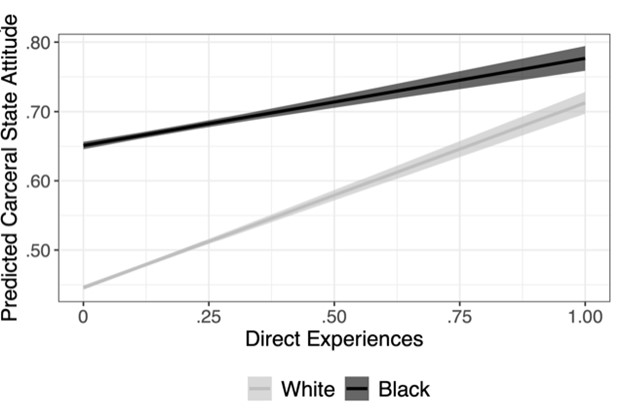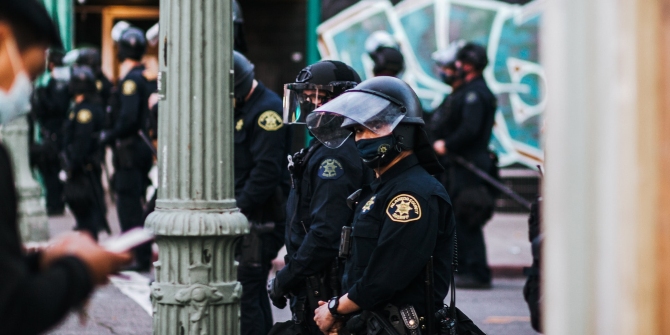
 How Americans interact with government shapes the way they view government policy. This is no more apparent than in the criminal justice system. In new research, Allison Anoll and Andrew Engelhardt examine how the attitudes towards criminal justice reform among white and Black Americans is influenced by their experiences of being stopped by police. They find that, compared to Black Americans, white Americans are more likely to support reform after having a negative experience when stopped by police; a difference the authors attribute to Black Americans having more negative existing expectations towards the criminal justice system.
How Americans interact with government shapes the way they view government policy. This is no more apparent than in the criminal justice system. In new research, Allison Anoll and Andrew Engelhardt examine how the attitudes towards criminal justice reform among white and Black Americans is influenced by their experiences of being stopped by police. They find that, compared to Black Americans, white Americans are more likely to support reform after having a negative experience when stopped by police; a difference the authors attribute to Black Americans having more negative existing expectations towards the criminal justice system.
A few days after the 2016 presidential election, actors Dave Chappelle and Chris Rock appeared together on the late-night comedy show Saturday Night Live. In the “Election Night” skit, the two Black actors are surrounded by white, liberal partygoers, watching the presidential election returns. As the night unfolds, one of the white characters exclaims, surprised, “I think America is racist!” Dave Chappelle responds, sarcastically, “I remember my great grandfather told me something like that, but he was like, a slave.” With a lifetime—in fact, generations worth—of racial discrimination behind them, the implication is that a new demonstration of racism to these two Black men is simply a “drop-in-the-ocean,” providing little new information to what is already a wealth of experience.
How experiences with the criminal justice system can change attitudes
We draw on this insight in new research: for some Americans, new contact with the criminal justice system, which includes law enforcement officers, the courts, and the prison system, is just a “drop-in-the-ocean” of political life. For others, even a brief encounter can provide enough new information for attitudes about the criminal justice system and reform policies to change dramatically. One’s starting attitudes matter quite a lot.
Social scientists have long known that people’s experiences with government workers, like welfare caseworkers or police officers, shape their views of related policy. In the context of the US criminal justice system, this perspective suggests that because Black Americans have disproportionately more negative experiences – for instance, more frequent and invasive stops by police – they hold more attitudes favoring reform compared to white Americans. More negative experiences produce negative evaluations of the relevant policy.
We argue instead that while negative experiences can surely foster a preference for reform, how they do so is likely inconsistent with this conventional wisdom. If someone expects to get harassed by a police officer and then they are harassed, their views about the nature of policing and the need for reform are unlikely to change. This is, as some criminologists call it, the “experience of the expected.” But if someone does not expect to be harassed and then is, this experience, which is inconsistent with expectations, may foster a more reform-oriented stance.
This weighing of new information against existing beliefs is known as Bayesian updating. To see how it works, consider Figure 1 below which shows how new information–represented on the x-axis–relates to differences in attitudes–shown on the y-axis–for two different groups. Initially, group 1 has more negative attitudes than group 2. But each panel shows how, given new information, attitudes might change.
Figure 1 – Patterns of attitude change

They might not change, with new information not persuasive or novel (a). They might move in parallel – groups have different experiences, but these experiences are similarly informative compared to each group’s initial beliefs (b). They might polarize, with the group possessing more negative initial attitudes having particularly negative experiences compared to the more positively disposed group (c). Or they might converge, as the group with more positive, initial attitudes gathers new, negative information through experience, while the group who was initially more negative has their beliefs simply reinforced (d).
We think this last option typifies the connection between recent contact with the carceral state – the systems and policies of criminal justice and mass incarceration in the US – and the attitudes of Black Americans compared to whites (and men compared to women). Black Americans and men, we expect, begin with on average more negative views of the carceral state. Any additional experiences are likely consistent with these expectations, so while attitudes might change, they do not change as much as those held by individuals with more positive initial views.
Such a result is likely for race and the US carceral state given how Black and white children are socialized into politics differently and have different experiences before becoming adults. Differences also exist among boys and girls within racial categories. Police officers are among the earliest figures about which children learn and Black parents frequently take deliberate steps to teach their children that the criminal justice system is dangerous and police officers potentially discriminatory. Further, Black children, especially Black boys, tend to have more invasive encounters with the police during their pre-teen and teenage years. Put together, Black Americans, and especially Black men, enter adulthood with an expectation that the carceral state is not meant to help people like them, a perspective contrary the one held by whites, and especially white women.

“Ticket” (CC BY 2.0) by chucknado
Measuring attitudes towards the carceral state
We tested this expectation using a cross-sectional web survey of over 11,000 Black and white Americans. We measured recent carceral state contact by asking respondents how often in the last five years they had been stopped by the police and appeared in court, and whether they had spent time in prison. We measured carceral state attitudes by adding together responses to questions like whether people felt the police in their local area treat people equally and if they support increasing pay for public defenders.
Figure 2 below shows that direct experiences do indeed have a stronger connection with carceral state attitudes among white respondents than Black respondents. A similar gap also exists across gender within group: Black women and white women more closely connect their recent experiences with their views of the carceral state compared to Black men and white men, respectively.
Figure 2 – Predicted effect of direct experiences on carceral state attitudes

Putting aside the frequency with which people engage with law enforcement, the quality of reported contact creates similar patterns. White people change their attitudes more after having a negative experience than Black Americans do, who report a similarly negative event. We asked respondents who reported being stopped by the police, for instance, to indicate whether they felt unsafe. Comparing white respondents with uniformly negative interactions to those with uniformly positive interactions sees a larger attitudinal difference than the same for Black respondents.
Building coalitions and restoring trust
Our results highlight challenges to restoring trust in a central state actor and for finding common ground around policy reform. On the one hand, the fact that most Black Americans have negative expectations means attitude change is only likely to occur with a fundamental shift in the role of police officers. Explicitly positive and repeated interactions, for instance, may be one way to restore trust. On the other hand, white attitudes appear to react dramatically in response to negative experiences, but these events are relatively rare, leaving a gaping distance between white and Black attitudes with respect to reform. Building cross-racial coalitions, then, or restoring trust in America’s political institutions, may have to start much earlier – for instance, when young children begin to learn about the role of government and their relationship to it.
- This article is based on the paper, ‘A Drop in the Ocean: How Priors Anchor Attitudes Toward the American Carceral State’ in the British Journal of Political Science.
- Please read our comments policy before commenting.
- Note: This article gives the views of the author, and not the position of USAPP – American Politics and Policy, nor the London School of Economics.
- Shortened URL for this post: https://bit.ly/3H9sSAO






